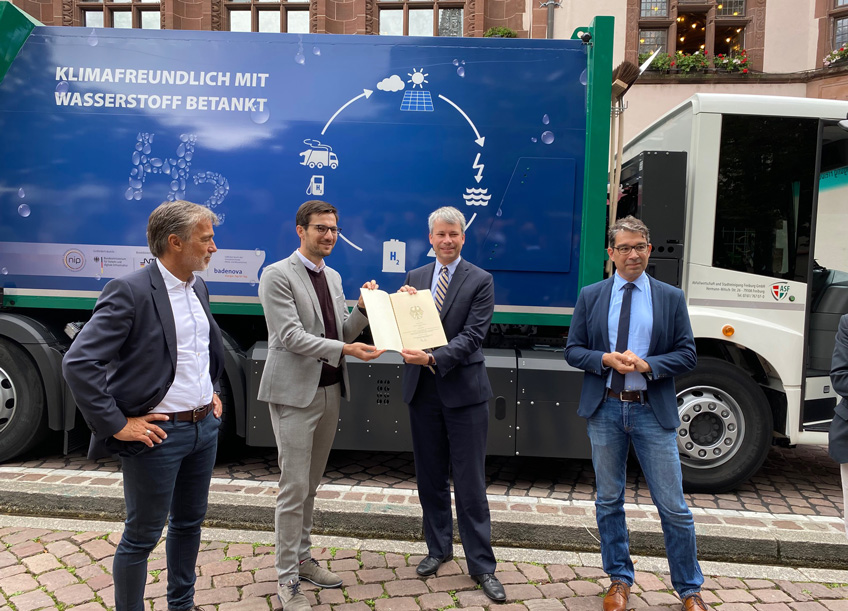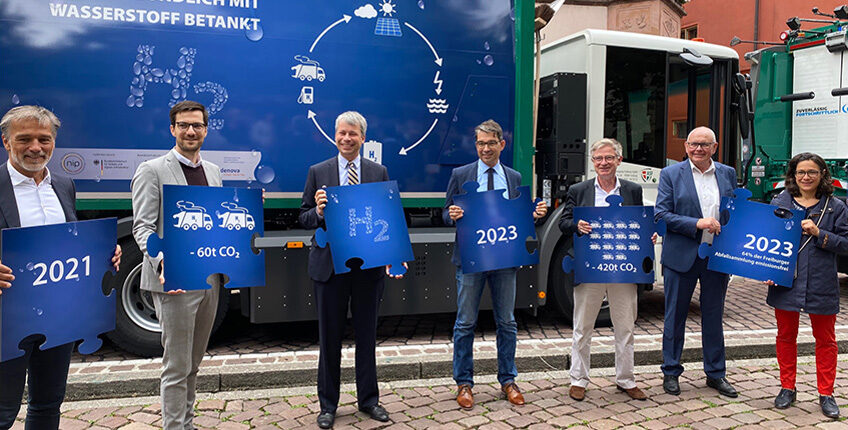Freiburg’s waste management authority is focusing on the use of electric mobility in the conversion of its vehicle fleet and will now also introduce the use of hydrogen technology.
Starting in July, Freiburg’s waste management authority, Abfallwirtschaft und Stadtreinigung Freiburg GmbH (ASF), will use two fuel cell-powered vehicles for the collection of biowaste and paper. These will replace two diesel-powered waste collection vehicles and save up to 60 tonnes of CO2 annually.
Although heavy-duty vehicles in particular are responsible for almost 30 per cent of carbon emissions in the transport sector and continue to contribute to climate change, technologies for alternative drive systems for this type of vehicle have been rather neglected in the past. In the meantime, hydrogen-powered fuel cell vehicles have also reached market viability, enabling ASF to expand its electric vehicle fleet into the field of waste collection. With 15 alternatively powered vehicles, the majority are currently on the road in the field of street cleaning.
“This represents a significant milestone for us in the direction of zero-emission mobility,” explains Michael Broglin, Managing Director of ASF. “By the end of 2023, a total of 14 waste collection vehicles with this climate-friendly technology will be on the roads of Freiburg and, at 64 percent, will contribute a larger share to municipal waste collection than diesel vehicles.”
Lord Mayor Martin Horn is also pleased about the environmentally friendly conversion of the ASF fleet: “Freiburg will then have one of the largest fleets with alternatively powered waste collection vehicles and will be a pioneer in this field. This is set to become a significant contribution to the realisation of the climate protection goals of the city of Freiburg,” says Horn.
Like classic electric vehicles, fuel cell vehicles are powered by an electric motor, drive with zero emissions and are very quiet. In contrast to purely electric vehicles, fuel cell vehicles can produce their own electricity while driving through the reaction of hydrogen with oxygen, without having to be connected to a power socket. This makes it possible to extend driving time and increase flexibility. The built-in battery system also makes it possible to store recovered braking energy and partially recharge the battery – a decisive advantage in day-to-day stop-and-go traffic.
The magnitude of Freiburg’s technology turnaround is also made clear by the statement of Dr Andre Baumann, State Secretary in the Baden-Württemberg Ministry of the Environment: “Road transport is one of our problem children in terms of climate protection in the state: greenhouse gas emissions are high and have unfortunately even risen in recent years. This must change. Only then will we achieve our climate goals. How the vehicles of the future will be powered is a central question. For buses, trucks and vehicles with high demands on performance, range and flexibility of use, hydrogen presents itself as an extremely promising solution option. That is why I am pleased that the city of Freiburg has chosen the proper and sustainable path.”
The first two hydrogen-powered waste collection vehicles were financed with financial assistance from federal funding support. As a result, 75% of the acquisition costs of around 1,440,000 euros (net) for both vehicles could be met through funding subsidies. A contribution of around 925,000 euros (net) was made within the scope of the “Clean Air 2017-2020” immediate action programme of the Federal Ministry of Transport and Digital Infrastructure (BMVI). The funding guideline is coordinated by NOW GmbH and implemented by the project management organisation Jülich (PtJ). Additional funding totalling 150,000 euros (net) was provided through the Innovation Fund of badenova AG & Co. KG. “Using fuel cell technology in waste management convinced our Council of Experts. We are pleased to be able to support ASF with funds from our Climate and Water Protection Innovation Fund,” says Mathias Nikolay, CEO of badenova.
With regard to the acquisition of further waste collection vehicles by 2023, Steffen Bilger, Parliamentary State Secretary at the Federal Ministry of Transport and Digital Infrastructure, also highlighted the orientation of the federal government: “Soon, 14 new waste collection vehicles will be in service in Freiburg: quiet and carbon neutral. The Federal Ministry of Transport and Digital Infrastructure is supporting the project with over 8 million euros. Hydrogen and fuel cell technology is an important future technology for Germany as a location for business and mobility. This is how we have defined it in the federal government’s National Hydrogen Strategy. In the transport sector, hydrogen is certainly a sensible addition to battery vehicles, which are limited in performance and range, to achieve the climate targets.”



